 Petzlover
Petzlover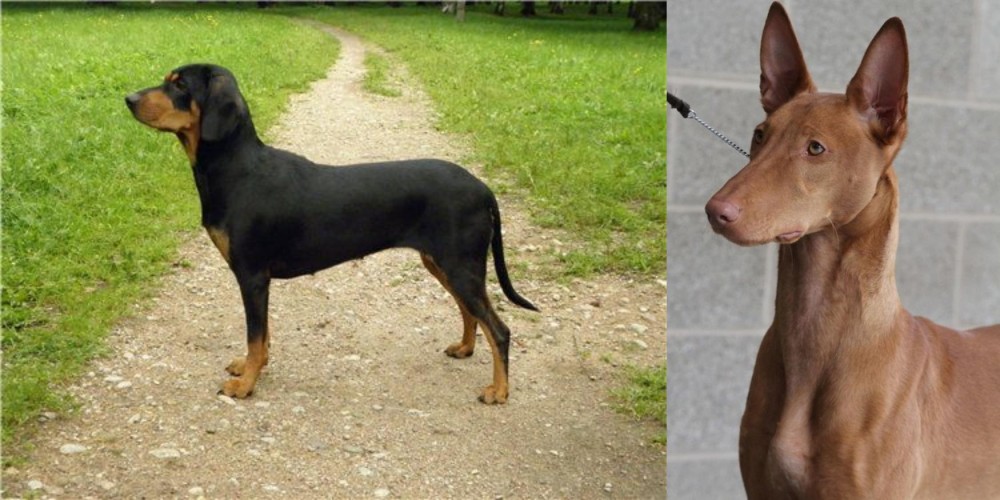 Latvian Hound is originated from Russia but Pharaoh Hound is originated from Malta. Latvian Hound may grow 15 cm / 5 inches shorter than Pharaoh Hound. Latvian Hound may weigh 7 kg / 15 pounds lesser than Pharaoh Hound. Both Latvian Hound and Pharaoh Hound has same life span. Latvian Hound may have more litter size than Pharaoh Hound. Both Latvian Hound and Pharaoh Hound requires Low Maintenance.
Latvian Hound is originated from Russia but Pharaoh Hound is originated from Malta. Latvian Hound may grow 15 cm / 5 inches shorter than Pharaoh Hound. Latvian Hound may weigh 7 kg / 15 pounds lesser than Pharaoh Hound. Both Latvian Hound and Pharaoh Hound has same life span. Latvian Hound may have more litter size than Pharaoh Hound. Both Latvian Hound and Pharaoh Hound requires Low Maintenance.
 The Latvian Hound is a medium sized Russian or Latvian hunting hound. The dog was bred in Latvia, Russia.
The Latvian Hound is a medium sized Russian or Latvian hunting hound. The dog was bred in Latvia, Russia.
He was developed from a number of English and Polish dogs as well as Lucernese breeds.
It is by no means a new breed and records of it go way back to the 1600s. A certain Duke Courland developed the dog so that it was also known as the Courland Hound. In 1922 the Latvian Association of Hunters' Associations was formed.
It was in 1971 that the Latvian Hound was was approved with it's name and a new standard was developed and approved. It isn't recognized by the AKC or the FCI.
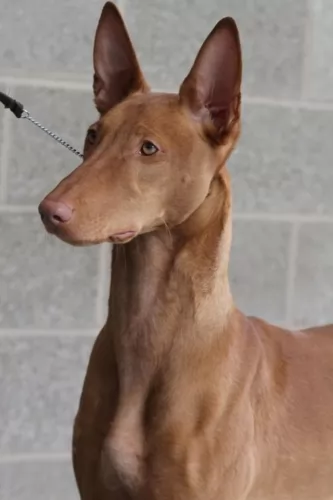 The Pharaoh Hound hails from Malta and is the national dog there. These dogs are rare and are looked upon as endangered. Because they are a primitive type dog, they enjoy good health.
The Pharaoh Hound hails from Malta and is the national dog there. These dogs are rare and are looked upon as endangered. Because they are a primitive type dog, they enjoy good health.
It has always been used as a hunting dog for rabbits. The dog has been recreated from mixing a combination of other breeds. It certainly seems to be an ancient dog breed, having existed for more than 2 000 years.
It is thought that the dog was imported to Malta by Phoenician traders. The dog has been classified as a member of the sighthound group, and arrived in England in the 1930s and to the USA in 1967. The breed was also officially recognized by the American Kennel Club in 1984.
 The Latvian Hound is a medium sized dog standing at between 40 to 48cm in height and weighing about 15 to 20kg.
The Latvian Hound is a medium sized dog standing at between 40 to 48cm in height and weighing about 15 to 20kg.
He has a deep chest, fairly long, floppy ears, a long tail with strong legs. The coat is double and is short, shiny and dense. He is an average shedder. He is essentially black with tan markings, with tan spots above the eyes. The eyes are dark brown and the nose is black.
The Latvian Hound may well be an exceptional hunter but he also makes a great family pet. He is looked upon as being a friendly, amicable, sweet dog.
Because he has been a working dog, he likes to be busy and will happily join in with all your hikes and swimming. He will also run with you while you cycle.
It’s a dog that doesn’t like to be left alone for long periods of time, being inclined to suffer with separation anxiety. He doesn’t take kindly to strangers either, but a dog which has been socialized and trained becomes more amicable.
Your Latvian is intelligent so you won’t have any trouble teaching him some simply commands. He is a friendly, lively dog and just having him in your home brings in a joyous atmosphere. He is an easy-going dog, but even so, if you don’t have a fair sized garden and you don’t have the time to exercise him, he is better off living on a farm or where there is a fair sized garden.
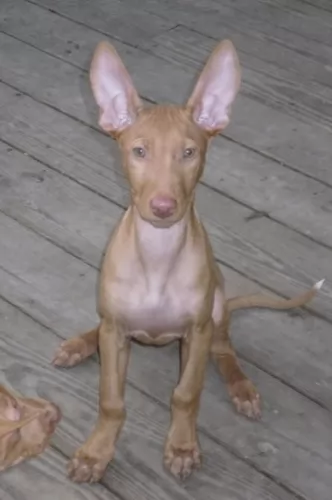 The Pharoah Hound is an elegant looking dog standing at roughly between 53 and 63cm and weighing 18 to 27kg.
The Pharoah Hound is an elegant looking dog standing at roughly between 53 and 63cm and weighing 18 to 27kg.
They are sleek dogs without any bulkiness about them and the coat is tight fitting with short smooth hair. The coat is a tan or red color, the eyes bright and the color of amber. The ears are fairly large and erect and the long tail slim with sometimes a white tip. The skin can be thin so the dog can be sensitive to the cold.
The neck of the dog is long and lean, as are the legs. An interesting aspect with this dog is that when the dog becomes excited its ears and nose become bright pink.
Pharoah Hounds are calm dogs and they can live in the city or in the countryside. They love kids and will be a wonderful playmate for them. Once he has had a lot of exercise and play, he is the kind of dog that will settle down happily with his human family for some quiet time.
Just as with any other dog, he will require training and socialization to make him obedient and better behaved.
 The Latvian Hound is an outgoing, fun dog to have around and a great dog for first-time dog owners too. He has always been a working dog, so he has developed skills such as being focused and tenacious.
The Latvian Hound is an outgoing, fun dog to have around and a great dog for first-time dog owners too. He has always been a working dog, so he has developed skills such as being focused and tenacious.
As a companion and family dog, you will have a true friend as he is sweet, loving and loyal and thrives on the attention of his human family. He is a playful dog, feisty and energetic, and will be protective too. Bring him into your home and you'll see what a bright place it becomes just having him there as pet and friend.
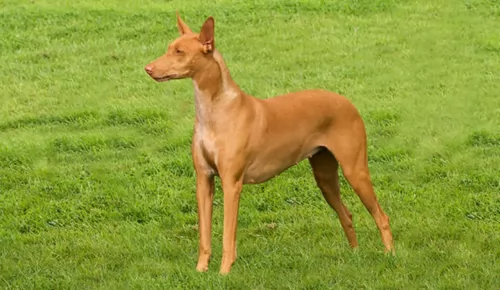 The Pharaoh Hound is quite interesting in a number of ways and he is independent, strong-willed and able to entertain and amuse himself.
The Pharaoh Hound is quite interesting in a number of ways and he is independent, strong-willed and able to entertain and amuse himself.
He loves to join in with the children and be part of their games. He’s intelligent and easily trained and he is also low maintenance.
While he’s not the most attractive dog to many people, others look at him as a true beauty. Whatever your opinion is, he will still make you a good family friend.
 The life span of the Latvian Hound is 12 to 14 years, and while there are no reported major health issues, all dogs face some kind of medical issues during their lives. The Latvian Hound can face things like hip dysplasia, eye problems, bloat and ear infections.
The life span of the Latvian Hound is 12 to 14 years, and while there are no reported major health issues, all dogs face some kind of medical issues during their lives. The Latvian Hound can face things like hip dysplasia, eye problems, bloat and ear infections.
Vaccines can protect your dog from contracting some illnesses which can be fatal.
There is controversy over pet vaccines but the problem is more about HOW the dog is vaccinated.
There was a time when puppies were vaccinated many times, but newer guidelines were updated in 2017, stating that core vaccines be given to adult dogs in intervals of 3 years or more, rather than every year.
Puppy vaccines still need to be done about every 3 weeks between the ages of 6 and 16 weeks against the likes of parvovirus and distemper. Get yourself a good vet who is skilled and safe with vaccines.
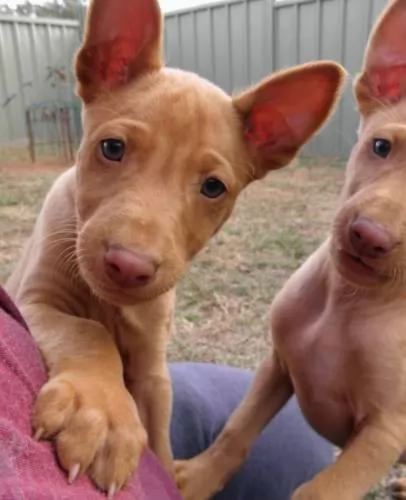 Pharaoh Hounds are uncommon outside of the Maltese Islands and with very little irresponsible breeding, these dogs are virtually free of genetic diseases. A common dog illness to look out for includes -
Pharaoh Hounds are uncommon outside of the Maltese Islands and with very little irresponsible breeding, these dogs are virtually free of genetic diseases. A common dog illness to look out for includes -
Your Pharaoh Hound can suffer from patella luxation, and in more severe cases it can be painful and even be disabling for a dog. This ailment comes about when the kneecap is dislocated from its normal position. You’ll find your dog lifting his hind leg quite a bit. Unfortunately this problem can lead to arthritis developing.
Other illnesses to look out for are bloat, cancer, skin allergies and ear infections.
 The Latvian Hound has a short coat that is easy to groom. He is a moderate shedder and brushing him twice a week will take care of all that loose hair. He’ll thrive on the attention this grooming session gives him and its the time to check him over for ticks and fleas too.
The Latvian Hound has a short coat that is easy to groom. He is a moderate shedder and brushing him twice a week will take care of all that loose hair. He’ll thrive on the attention this grooming session gives him and its the time to check him over for ticks and fleas too.
Check the inside of his ears. Without even realizing it, dirt and wax can build up and result in an ear infection. His ear may be red and you’ll notice him shaking his head and scratching at his ears. Be very careful about cleaning his ears as going to deep can damage the ear.
Any grooming of your dog that you can’t manage can be attended to by professional dog groomers.
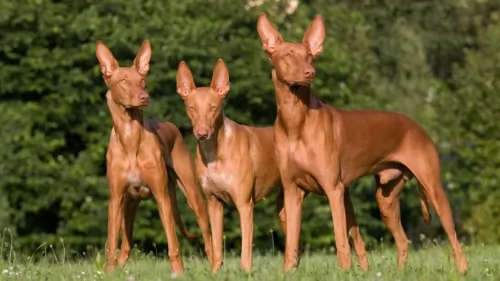 The Pharaoh Hound’s short coat is easy to groom and it will require a brushing at least twice a week just to get rid of loose hairs.
The Pharaoh Hound’s short coat is easy to groom and it will require a brushing at least twice a week just to get rid of loose hairs.
At the same time trim his nails, check inside his ears for infection and look inside his mouth for any rotting teeth.
Your Pharaoh Hound is an active, energetic dog and he will need a good dose of exercise every day. Take him with you on your walks or allow him to join you with your hikes, jogging or cycling. At home involve him in some ball games.
How much any adult dog eats will depend on a number of factors such as size of dog, age and his activity levels.
You get some excellent dog kibble these days on the market but the idea is to choose one of the high quality ones which have minerals and vitamins in them. Home-made food is also good for your pet and this should be kept simple, consistent and nutritious.
Every now and then you can add in some boiled chicken, brown rice or pasta and sweet potato, carrots and spinach to the kibble. Some raw meat added in can also be of benefit to your dog’s health.
Stay away from spicy, exotic foods and keep your dog's food easy like suggested so as to avoid digestive problems